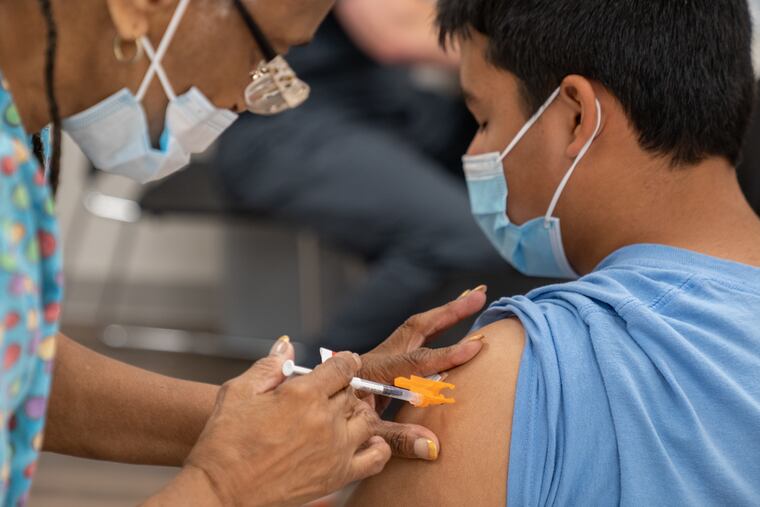Philly area prepares to distribute booster shots, with approval expected soon for certain groups
The looming announcement has led state and local officials in Pennsylvania and New Jersey to solidify plans for distributing another round of shots — while still working to persuade the unvaccinated.

Suzie Oswald, an emergency medical technician, has been ready for her coronavirus booster shot since last month, when she first heard the Biden administration discuss its plan for a broad rollout.
While the ensuing mixed messages from federal officials on the need for boosters have left the 39-year-old Jenkintown resident with questions, she said she is still ready to roll up her sleeve.
“I’m a little confused, only because it seems they’re not sure how long the vaccines are working for,” she said. “But for me, if it’s going to protect me longer, I’m all for it.”
As a health care worker, she is one of millions of people who could be eligible for a third dose of the Pfizer vaccine in a matter of days. First, the CDC and FDA must concur with the FDA panel that voted Friday to make select high-risk groups eligible. Federal officials are set to finalize the decision this week, and rarely go against the advice of the advisory committee that met Friday.
The looming announcement has led state and local officials in Pennsylvania and New Jersey to solidify plans for distributing another round of shots — while still working to persuade those who are unvaccinated to come in for a first dose.
What local health officials are planning for
Philadelphia could start giving boosters as quickly as a day after the decision, using its existing provider network, city Health Department spokesperson James Garrow said, and officials expect to ask people to show proof of eligibility, including their vaccine card and documentation indicating they fall into the approved categories.
The Biden administration’s coronavirus response team said last month that boosters — a third dose given eight months after the second — could help fend off variants by eliciting an even stronger immune response. Early data have shown the vaccines’ protection may wane over time, especially among those with weaker immune systems. Even without boosters, experts say vaccines remain highly effective in preventing severe hospitalization and death.
Public health leaders and experts said they anticipate most of the region’s vaccinated residents in the high-risk groups will, like Oswald, want a booster, especially given that Pennsylvania and New Jersey are among the most-vaccinated states in the country, with more than 70% of their total populations having received at least one shot.
“This group is 100%, by definition, vaccinated, so it should be a relatively straightforward exercise,” New Jersey Gov. Phil Murphy said.
The coming rollout represents a scaled-down version of what President Joe Biden unveiled last month. Biden initially announced that booster shots would be recommended beginning this week for all adults eight months after receiving their second dose. Instead, the 18-person advisory panel on Friday voted unanimously to approve the extra shots for people who are immunocompromised, 65 and older, or at higher risk due to their profession.
In anticipation of the final FDA decision, Pennsylvania acting Health Secretary Alison Beam on Tuesday ordered vaccine providers to offer online booster shot scheduling, as well as a phone number that connects to a live person during business hours. They also must offer walk-in appointments when possible, she said, and work with local aging organizations to help get shots to people who are homebound.
“We can assure that, first, we have the vaccine available in Pennsylvania,” Beam said, “and, second, providers are ready to start administering boosters as soon as we have the CDC guidance.”
Meanwhile, New Jersey officials will likely reopen a Gloucester County mega-site that vaccinated more than a hundred thousand in the first rollout, relying on that clinic combined with “strong county sites” and existing providers to give boosters to about 1.1 million residents who may be eligible, officials said Monday.
In the Pennsylvania suburbs, boosters would be available within days of the decision at existing county sites, said officials in Bucks, Chester, Delaware, and Montgomery Counties.
Montgomery County will expand the hours of its Monday-to-Friday clinics, while Chester County may open a few more sites, spokespeople said. Delaware County medical adviser Lisa O’Mahony said the county is planning large vaccination clinics in October that will offer first and second shots as well as boosters.
O’Mahony, a physician, said the booster shot news should only reinforce the importance of getting vaccinated.
“We certainly want to make sure people continue to recognize that the unvaccinated are really the concern” more than boosting the fully vaccinated, she said.
Benefits of boosters
Some local public health experts agreed that the efficacy of the vaccine is what should be taken away from recent national debate.
“It’s understandable that it can be challenging to make sense of all of this,” said Suzanne Redington, an assistant professor of public health at Arcadia University. The decision not to vaccinate the general public is not rooted in concerns about the safety of vaccines, she added, but in wanting not to make a decision without more data.
» READ MORE: Nervous about getting the COVID-19 vaccine? Don’t believe these myths.
The benefit of boosting people who are most vulnerable to the virus remains clear, said Thersa Sweet, an associate professor of epidemiology and biostatistics at Drexel University.
“I think getting a booster for high-risk populations would not only help the individual themselves, but also is going to help all of us,” Sweet said. “If they have durable protection, then they are less likely to transmit the virus.”